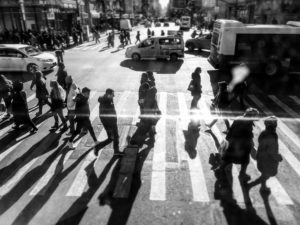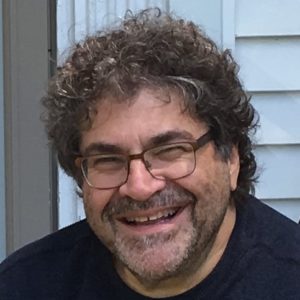Journeys to Humanism: An Enlightened Catholic Education
 Photo by Michael Daniels on Unsplash
Photo by Michael Daniels on Unsplash Journeys to Humanism, theHumanist.com’s regular series, features real stories from humanists in our community. From heartwarming narratives of growth, to more difficult journeys, our readers open up about their experiences coming to humanism.
Joseph Vincenzino
Rahway, New Jersey
I was born into a very Catholic Sicilian-American family in 1958 and grew up in a community in Staten Island, NY, filled with mostly similar Italian and Irish Catholic people.
I started questioning religion around eight years old when I stopped going to church (though I attended twelve years of Catholic school, and was baptized and confirmed). Unlike the typical horror stories that many tell about Catholic education, mine was quite the opposite, and I attribute mine to making me an atheist through education and enlightenment.
 Being in school in the 60s and 70s meant an education that was informed by the global revolution. In my seventh and eighth-grade religion classes, we learned about indulgences and the Reformation, and we spent time analyzing songs like “American Pie.” In my Catholic high school, I took a survey of the world’s religions, read Siddhartha, and had elective classes on Futurology and Thanatology—definitely not your normal Catholic religious teachings. It was also like a prep school, so there was a focus on the development of critical thinking skills, along with math and sciences. I wonder why most of my contemporaries did not come out as non-believers, as I know many still are devout Catholics.
Being in school in the 60s and 70s meant an education that was informed by the global revolution. In my seventh and eighth-grade religion classes, we learned about indulgences and the Reformation, and we spent time analyzing songs like “American Pie.” In my Catholic high school, I took a survey of the world’s religions, read Siddhartha, and had elective classes on Futurology and Thanatology—definitely not your normal Catholic religious teachings. It was also like a prep school, so there was a focus on the development of critical thinking skills, along with math and sciences. I wonder why most of my contemporaries did not come out as non-believers, as I know many still are devout Catholics.
I was completely an atheist during my high school years. I no longer had any connection to a church, and only attended services if they were connected to a family or friend, like a wedding or a funeral. This continued through my college years, and into my adulthood, and all the time I remained a “silent atheist.” I never really declared myself as one, but I think most people who were close to me knew that I didn’t believe.
So, what about humanism? During my college and later adult years, I started to think about what I was, rather than what I wasn’t, since atheism described what I didn’t believe in. I never read anything specifically about atheism, or any other philosophy, but it came to me that because of my lack of belief in a deity, that there must be something in its place that would be responsible for what was happening in the world. The only answer I could come up with was human beings ourselves. I started calling myself a humanist, at least in my head, because that was the only “ism” that I seemed to belong to.
So, for the longest time, well into my thirties, I thought of myself as a humanist, not knowing that any formal philosophy or movement existed, until one day I met one. In the late 90s, I was living in lower Manhattan, and I was walking in the area around the World Financial Center when I saw an older woman handing out pamphlets that had the word “humanist” on them. I struck up a conversation, told her my story, and asked about humanism. That woman was Beth Lamont, wife of Corliss Lamont, author of The Philosophy of Humanism. She invited me to a dinner with a group of humanists and, as a side note, she actually lived in my building and eventually bought my apartment.
Soon after meeting Beth Lamont, I married and moved to New Jersey, but unfortunately was divorced a few years later. Those events lead me to a bigger involvement in the non-believer community. After I divorced, I decided to expand my social circle, and through Meetup.com, I found a couple of atheist and humanist groups. Eventually, I became a co-organizer of one and was very involved in its activities, including tabling at the local town fair. That group no longer exists, but I have been a member of the New Jersey Humanist Network since 2011, and I am currently a member of the board, also chairing the marketing committee. I am also very active on social media and admin a number of Facebook groups and pages.
Even though I started as a “silent atheist,” as I may not be the most radical or outspoken, I have always, and continue to, make efforts to keep and grow the secularist community and to educate others on the philosophy of humanism as the positive way that we humans can make a difference and a better world. I like to tell others who ask as an atheist what I believe in, “if we don’t have god to believe in, who else do we have, other than us, we humans, to make things happen?” That’s why I’m a humanist.
We all have our own stories of how we came to be humanists, and we want to hear yours! Fill out the form here to be featured in this series.
